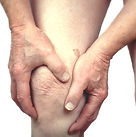To Schedule An Appointment
Common Conditions
People often ask me what rheumatology means. The best way to answer this is that if you start with the whole body, and take away the organs that everyone else looks after - the heart, lungs, kidneys, bowels, brain, nerves - we look after the rest. We look after conditions that affect joints and bones, connective tissue and blood vessels, and we look after conditions that affect multiple organs so they don't neatly fall into anyone else's patch.
Of course we are covered in muscles from head to toe. Sometimes we overdo it and develop a muscle strain - very common in the back. We can upset the tendon - the tough part between the muscle and the bone - particularly common in the shoulder. Finally, the insertion of muscle into the bone itself can cause pain, in the elbow and ankle.
Cartilage is a remarkable material, incredibly smooth and strong, with no blood running through it, and capable of withstanding immense compression. Nonetheless, it does tend to wear thin in places - in some people faster than others. This is a common cause of pain in the hip and knee, as well as the spine. Arthritis in the spine can also pinch nerve roots as they exit the spine.
We all have uric acid in our blood, but it doesn't dissolve very well in the blood and when levels rise it can form crystals. These lodge in the joints and can cause excruciating pain.
Find more information here. There's some good dietary advice here.
Rheumatoid arthritis is a disease most common in young women, in which the immune system attacks the joints instead of concentrating on fighting bugs. It typically affects the hands and wrists early on, but can affect many other joints too.
There's lots of information available on the web. more advice here as well as the UK patient society.




